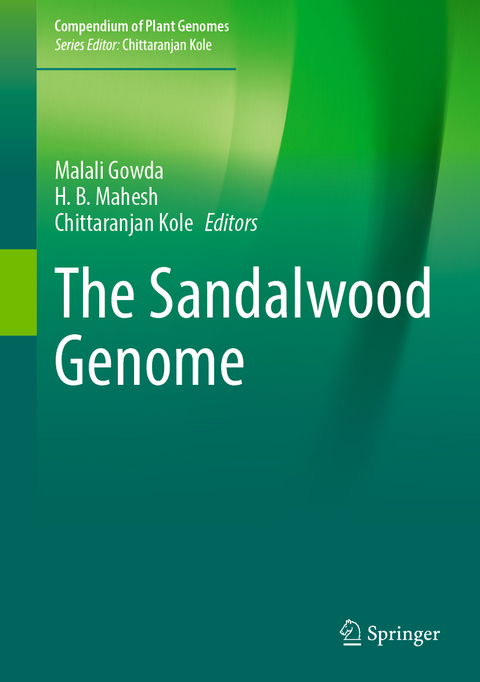
The Sandalwood Genome
Springer International Publishing (Verlag)
978-3-030-93393-7 (ISBN)
This book is the first comprehensive compilation describing the importance of sandalwood in national and international markets, genetic resources, molecular markers, whole genome sequencing, and pathway genes involved in oil biosynthesis, aroma and fragrance. Application of various "omics" approaches in delineating genome architecture and annotation of genes is highlighted. This book comprises 10 chapters covered over 200 pages authored by the researchers involved in sandalwood genomics.
The sandalwood, Santalum album is known for its unique fragrance and finest wood available for carving. Also, sandalwood is intertwined with Indian culture and it is the second most valuable and expensive tree in the world.
lt;p>Dr. Malali Gowda has gained 25 years of experience in the areas of Genomics, Bioinformatics, Bio-diversity and Rainforest. He has worked in Universities in India (University of Agricultural Sciences Bengaluru and The Maharaja Sayyajirao University of Baroda, Gujarat) and in the United States of America {Michigan State University (MSU), North Carolina State University (NCSU) and Ohio State University (OSU)}. Dr. Malali Gowda had returned to India in 2010 through the Ramalingaswamy Fellowship (reverse brain-drain) program of Dept. of Biotechnology, Govt. of India. With the support of DBT, he has established the first state-of-the-art 'Next-Generation Genomics Facility' in India at C-CAMP/NCBS/INSTEM campus, Bangalore. He has established Centre for Functional Genomics and Bioinformatics at The University of Trans-Disciplinary Health Sciences & Technology (TDU), Bengaluru. He has developed several original and novel genomic technologies to sequence DNA and RNA (Super HLA-typing, Robust-SAGE, 5'-RATE, RNASeq). In addition, he has established genomics services for whole-genome sequencing, exome (coding part) sequencing, transcriptome sequencing, epigenetic profiling, and genomics big data analysis. His lab has sequenced over 100 genomes (prokaryotes and eukaryotes) from various species. His group has contributed the largest genomics data from India, and this data is freely made available to the public through GenBank and NCBI. Dr. Gowda's vision is to create greener earth through social community participation. He has founded two non-profit organizations; DNA Life and Biodiversity Conservation and Research Trust (BCRT). His work is considered to be a model system for reviving vegetation, water and combat climate change. This work was appreciated by conferring Environmental Stewardship (Passion in Science) Award 2019 (by New England BioLabs, USA). Dr. Malali Gowda is recognized as an epitome of passion and inspiration in teaching as well as motivating students, faculty and citizens to solve complex national and international issues like climate change through Personalized DNA Life approaches.
Dr. Mahesh. H. B. is currently working as an Assistant Professor at University of Agricultural Sciences, Bangalore (UASB). He obtained his B.Sc. Agri and M.Sc. Agriculture in Genetics and Plant Breeding degrees from University of Agricultural Sciences, Bangalore, India. He has worked in Monsanto in various aspects of corn molecular breeding such as pre-selection through seed chipping, marker-assisted breeding, haplotyping and SNP-based fingerprinting. He has received eight gold medals in B.Sc. and M.Sc. for his outstanding performace in academics. In Monsanto, he has received Rapid Recogition award, Emerging Star award and Breeding Champion award for his outstanding contribution to corn breeding. He has received prestigious and highly competititve Monsanto's Beachell-Boralug International Fellowship from Texas A & M, USA for his Ph. D research at University of Agricultural Sciences, Bangalore, and Ohio State University, Columbus, USA. He has 10 years of experience in plant breeding, genomics and bioinformatics. He took a lead in genome sequencing and functional annotation of rice, finger millet, sandalwood, horsegram, winged bean, Magnaporthe oryzae, Sarocladium oryzae and Bacillus velezensis genomes. He has been conferred with Jawaharlal Nehru Award for Outstanding Doctoral thesis research in Crop Science by Indian Council Agricultural Research (ICAR), New. Delhi. Presently, his research interests are application of genomics, transcriptomics and proteoimcs technologies to understand economically important traits in crops like rice, fingermillet and other important food crops.
Prof. Chittaranjan Kole is an internationally reputed scientist with an illustrious professional career spanning over thirty-seven years and original contributions in the fields of plant genomics and biotec
Chapter 1. Sandalwood: The King of Aroma in Plant Kingdom.- Chapter 2. Historical and Cultural Importance of Sandalwood in India and Its Role in Conservation of Natural Populations.- Chapter 3. Sandalwood: Traditional Knowledge from Ayurveda.- Chapter 4. Genomic Resources in Indian Sandalwood: Implications in Conservation and Breeding.- Chapter 5. Whole Genome Sequence of Sandalwood and Its Comparative Study.- Chapter 6. Mining of SSRs and SNPs in Sandalwood Genome.- Chapter 7. Sandalwood Fragrance Pathway and Its Engineering for Sustainable Production of High-Value Santalols.- Chapter 8. Sandalwood Essential Oil and Its Phyto-Chemistry.- Chapter 9. Scope of Proteogenomic Analysis for Indian Sandalwood (Santalum album).- Chapter 10. Future Prospects of Sandalwood Research.
| Erscheinungsdatum | 03.03.2022 |
|---|---|
| Reihe/Serie | Compendium of Plant Genomes |
| Zusatzinfo | XVIII, 103 p. 26 illus., 16 illus. in color. |
| Verlagsort | Cham |
| Sprache | englisch |
| Maße | 178 x 254 mm |
| Gewicht | 438 g |
| Themenwelt | Naturwissenschaften ► Biologie ► Botanik |
| Schlagworte | Cloning • genomics • Indian Sandalwood • Proteomics • Santalol Biosynthesis • Santalum album |
| ISBN-10 | 3-030-93393-8 / 3030933938 |
| ISBN-13 | 978-3-030-93393-7 / 9783030933937 |
| Zustand | Neuware |
| Informationen gemäß Produktsicherheitsverordnung (GPSR) | |
| Haben Sie eine Frage zum Produkt? |
aus dem Bereich


